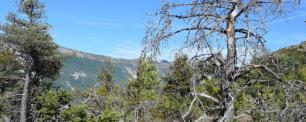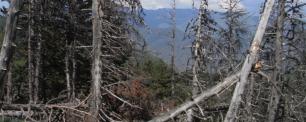RESIBIO
Resilience and species climatic niche in woody communities under climate change-driven disturbances
Climate change is altering the regimes of key disturbances such as drought, wildfires and pests. This has important consequences for the dynamics and functioning of ecosystems, and therefore to their resilience in front of changing climates. We need a better understanding on how species performance (demographic processes of recruitment, growth and mortality) varies in space and time determining the response of species, populations and communities, responses that govern forest and shrubland resilience to global change.
The main objective of the project is to study the role of the climatic niche (the ideal conceptual framework to assess the response of species and their populations to climate change) in the resilience of woody communities experiencing three types of disturbances associated with climate change: drought, fires, and insect outbreaks.
The project will evaluate the response to disturbances of different types of forests and shrublands along a gradient encompassing semi-arid, meso-Mediterranean, and mid-European climates (from southern Iberian Peninsula to Central Europe) and on a global scale.
Within the framework of species niches, the project will standardize and quantify the differences between species in their climatic adaptation and demographic responses, both at the local level and in a biogeographic context, to the influence of three key disturbances and their interaction: drought, fires, and insect outbreaks.
The mechanistic understanding of resilience to these disturbances obtained through the project will provide new insights at empirical, theoretical, and methodological levels, which will be applied to infer ecosystem vulnerability to future climatic changes.
Proyecto PID2020-115264RB-I00 financiado por MCIN/ AEI /10.13039/501100011033








